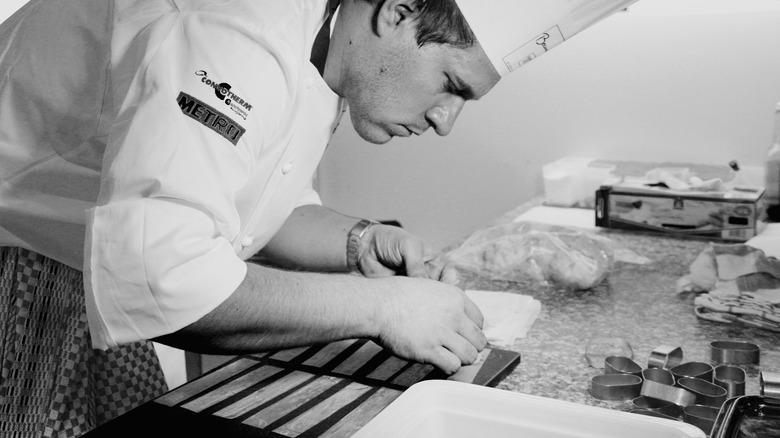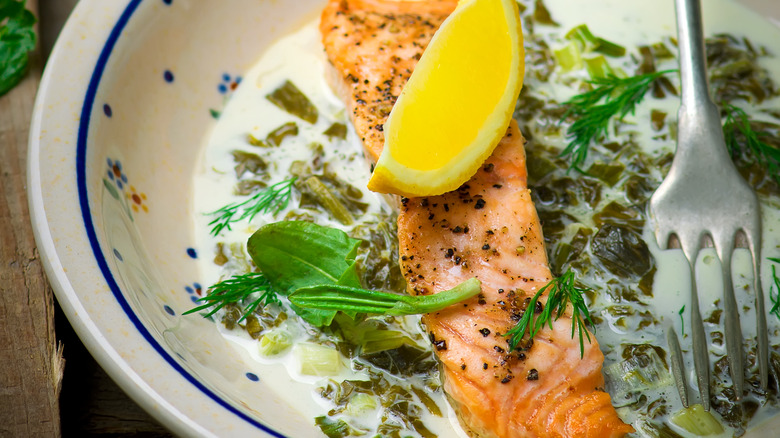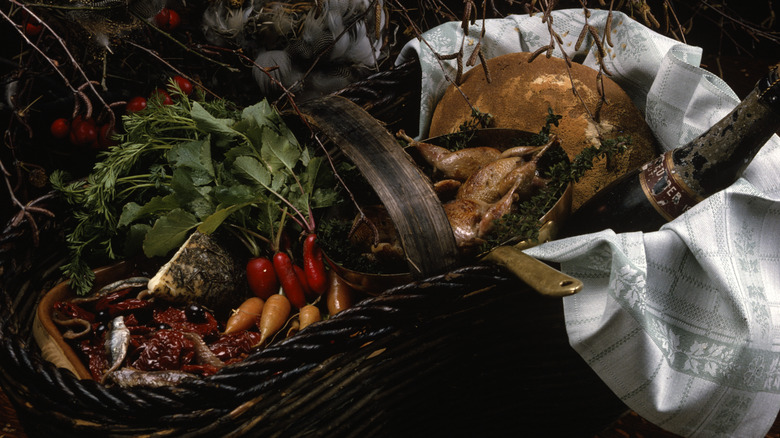The French Culinary Movement That Transformed International Cuisine
While it may seem like something of a cliché to say, the fact is that the French have influenced the global fine dining scene since Escoffier first developed the hierarchy for the modern professional kitchen in the 19th century. The Michelin Guide created a bonafide list of the best restaurants in France, with a star from them being one of the most coveted prizes in the culinary world. Chef Fernand Point defined classic French cooking, marrying what The Guardian calls "the two strands of French restaurant cuisine: tradition and terroir; Paris and the provinces."
It was in the provinces that, during the late '60s, a transformation began. There was a rejection of the stuffy, overbearing force of classic haute cuisine. In places like Roanne and Lyon, names like Bocuse and Troigros began to enter the culinary vernacular. Something big was happening to French food. A change was in the works. We know it today as Nouvelle Cuisine, and it would go on to become the defining culinary movement of the late 20th century.
What is nouvelle cuisine?
Nouvelle Cuisine was a phrase first coined by the duo Henri Gault and Christian Millau to describe the revolution in French food that was taking place. Together they developed the Gault&Millau restaurant guide, which would lay the groundwork for nouvelle cuisine. Their mission statement read in part: "Down with the old-fashioned image of the typical bon vivant, that puffy personage with his napkin tucked under his chin, his lips dripping veal stock ..." and listed high-quality ingredients, shorter cooking times, smaller menus, abandonment of marinades, and lighter sauces as the foundation of the new movement (via The Guardian and Prestige).
One of the restaurants that helped raise nouvelle cuisine above theory and into a proper food revolution was La Maison Troisgros, home to two talented brothers, chefs Jean and Pierre. They pioneered a style of cooking that was not only aesthetically pleasing but honed in on the simplicity and quality Gault&Millau preached. The Brothers Troisgros' most famous dish, salmon in sorrel, became the defining recipe of Nouvelle Cuisine. A result of serendipity, according to Club Enologique, this lightly cooked salmon — which ran contrary to the overcooked fare of the day — sat atop a simple sauce of sorrel, reduced cream, white wine, and shallots. This simple, elegant dish, broke all the rules of the dominating Haute Cuisine and perfectly encapsulated Gault&Millau's theory of honoring ingredients and presenting them beautifully.
The international legacy of nouvelle
The success of the nouvelle cuisine revolution is not just evident in modern French cooking, but in restaurants across the globe. While having little to no influence on the long-established food cultures of Spain and Italy, Britannica explains that Nouvelle's principles of fresh, local produce, and the rejection of mass-produced food had a great impact on the United States and the United Kingdom. New American cuisine, brought to life by Alice Waters, created a culture influenced by fresh, regional produce and simple preparation techniques. Similarly, U.K. chefs began to reject the stodgy, outdated notion that British food was bad food. Gordon Ramsay, perhaps the most culturally renowned of this new breed of English chef, took the bounty of quality ingredients his island nation had to offer and combined them with the aesthetics and dedication to quality of nouvelle cuisine.
Fusion cuisine, too, has been tremendously influenced by nouvelle. Brittanica continues about how the introduction of Wagyu beef, foie gras, and hot peppers in Japanese cooking or Asian fusion meals using Western ingredients and Asian spices, are all somehow linked to the Nouvelle revolution. It has been said, by Wendell Steavenson in The Guardian, that nouvelle cuisine left France behind in the globalization of food. That may be true, but without nouvelle, phrases like "fresh, local produce," "top quality meat," or "expertly prepared and served" would just be words on a page. Nouvelle gave modern Western cooking its legitimacy.


